|
|
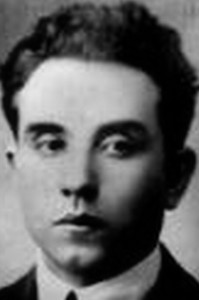 Born: July 13, 1888 in Tepatitlan, Jalisco, Mexico.
Born: July 13, 1888 in Tepatitlan, Jalisco, Mexico.Martyred: April 1, 1927 in Guadalajara, Jalisco, Mexico. Beatified: November 20, 2005 by Pope Benedict XVI. Married layman in the archdiocese of Guadalajara, Mexico. Martyred in the Mexican Revolution. Last words of Bl. Anacleto Gonzalez Flores..... "I die, but God does not die. Viva! Cristo Rey!" 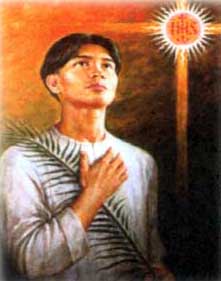 Martyr.
Martyr.b. 1654, Ginatilan, Cebu, Philippines d. 1672, Tomhom, Guam (Canonized a Saint on Oct. 21, 2012) Educated by the Jesuits in the Visayas, a section of the Philippines. Pedro could read, write and speak Visayan, Spanish, and Chamorro, paint, draw, sing, and worked as a carpenter. Teenager catechist who worked with Spanish Jesuit missionaries to the violent Chamarros in the Ladrones Islands (modern Marianas) in 1668. Because he was a Christian on a mission to catechize the Chamorros, and Baptisms, Calungsod was murdered by two natives. He died trying to defend Father Diego Luis de San Vitores. Prayer: Almighty God, by whose gift St. Pedro the Martyr witnessed to the Gospel, even to the shedding of his blood: grant, by his example and intercession, that we too may live for You, boldly and steadfastly, confessing Your name through our Lord, Jesus Christ, Your Son, who lives and reigns with You in the Holy Spirit, one God, forever and ever. Amen. St. Pedro Calungsod, pray for us! 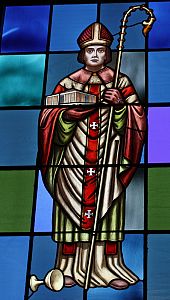 1197-1253
1197-1253Second son of Richard and Alice de Wych. His father died when the boy was young. The family fell upon hard times, but as soon as he became old enough, Richard took over management of their estates and brought them back to profit. Educated at Oxford, Paris and Bologna. Chancellor of Oxford University. Legal advisor to Saint Edmund Rich and Saint Boniface of Savoy, the Archbishops of Canterbury. Priest. Bishop of Chichester. Miracles and cures occurred at his shrine in Chichester. "Thanks be to Thee, my Lord Jesus Christ For all the benefits Thou hast given me, For all the pains and insults Which Thou has borne for me. O most merciful Redeemer, Friend, and Brother, may I know Thee more clearly, Love Thee more dearly, Follow Thee more nearly, Day by day. Amen." -prayer by St. Richard St. Richard, pray for us! 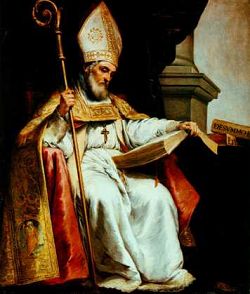 Born in Cartagena, Spain in 560
Born in Cartagena, Spain in 560Died in Seville, Spain in 636 Doctor of the Church. Patron Saint of Computer Users. Served as Archbishop of Seville for more than three decades and is considered, as the historian Montalembert put it in an oft-quoted phrase, "le dernier savant du monde ancien" ("the last scholar of the ancient world"). Indeed, all the later medieval history-writing of Hispania (modern Spain and Portugal) was based on his histories. "Almighty and eternal God, who created us in Thy image and bade us to seek after all that is good, true and beautiful, especially in the divine person of Thy only-begotten Son, our Lord Jesus Christ, grant we beseech Thee that, through the intercession of Saint Isidore, bishop and doctor, during our journeys through the internet we will direct our hands and eyes only to that which is pleasing to Thee and treat with charity and patience all those souls whom we encounter. Through Christ our Lord. Amen." "Prayer purifies us, reading instructs us. Both are good when both are possible. Otherwise, prayer is better than reading. If a man wants to be always in God's company, he must pray regularly and read regularly. When we pray, we talk to God; when we read, God talks to us. All spiritual growth comes from reading and reflection. By reading we learn what we did not know; by reflection we retain what we have learned. Reading the holy Scriptures confers two benefits. It trains the mind to understand them; it turns man's attention from the follies of the world and leads him to the love of God. The conscientious reader will be more concerned to carry out what he has read than merely to acquire knowledge of it. In reading we aim at knowing, but we must put into practice what we have learned in our course of study. The more you devote yourself to study of the sacred utterances, the richer will be your understanding of them, just as the more the soil is tilled, the richer the harvest. The man who is slow to grasp things but who really tries hard is rewarded, equally he who does not cultivate his God-given intellectual ability is condemned for despising his gifts and sinning by sloth. Learning unsupported by grace may get into our ears; it never reaches the heart. But when God's grace touches our innermost minds to bring understanding, his word which has been received by the ear sinks deep into the heart." - from Book of Maxims by St. Isidore 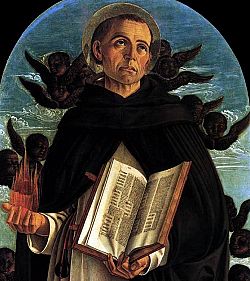 b. 1350 Valencia, Spain
b. 1350 Valencia, Spaind.1419 Vannes, Brittany, France Fourth child of the Anglo-Scottish nobleman William Stewart Ferrer and his Spanish wife, Constantia Miguel. Dominican priest. Missionary. Taught theology. Adviser to the King of Aragon. During a severe fever in 1398, Vincent had a vision of Christ, St. Dominic de Guzman and St. Francis of Assisi. It was a life changing experience - Vincent received supernatural gifts and believed that he was a messenger of penance, an "angel of the apocalypse" sent to prepare humankind for the Judgement of Christ. Converted thousands in Spain, France, Italy, Germany, the Netherlands, England, Scotland and Ireland. Had the gift of tongues (he spoke only Spanish, but all listeners understood him), lived in an endless fast, celebrated Mass daily, and known as a miracle worker; reported to have brought a murdered man back to life to prove the power of Christianity to the onlookers, and he would heal people throughout a hospital just by praying in front of it. He worked so hard to build up the Church that he became the patron of people in building trades. "If you truly want to help the soul of your neighbor, you should approach God first with all your heart. Ask him simply to fill you with charity, the greatest of all virtues; with it you can accomplish what you desire." - St. Vincent Ferrer from On the Spiritual Life 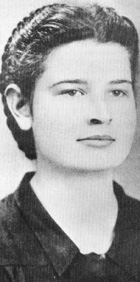 Born: Jan. 7, 1931 at Fiobbio di Albino, Italy.
Born: Jan. 7, 1931 at Fiobbio di Albino, Italy.Died: Apr. 6, 1957 of wounds received in a rape attempt at Fiobbio di Albino, Italy. Beatified Oct. 4, 1987 by Pope John Paul II. One of eight children in a poor family in the diocese of Bergamo, Italy. Trained as a seamstress, she began work in a fabric factory at age 15. A pious girl, she had made a private vow of chastity to God, and considered religious life, but continued to live at home to help her mother take care of the remaining children. Catechist. One day as she returned home from work, she was attacked by a would-be rapist, and died a martyr to chastity. Quote: "May I never allow myself even the smallest compromise with sin, whether in dress, speech, reading, looks, or entertainment." - Blessed Pierina Morosini 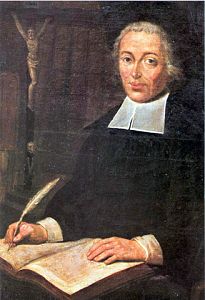 Born: 1651 at Rheims, France
Born: 1651 at Rheims, FranceDied: 1719 at Saint-Yon, Rouen, France of natural causes. Studied for the priesthood in Paris, France, but quit to care for his brothers and sisters upon the death of his parents. When his siblings were grown, John returned to seminary. Canon of Rheims, France in 1667. Ordained in 1678. Doctor of theology in 1680. Spiritual director of the Sisters of the Holy Infant who were devoted to teaching poor girls. Founded the Institute of the Brothers of the Christian Schools (Christian Brothers) in 1681, established and supported academic education for all boys. He liquidated his personal fortune, and his Brothers expected him to use it to further his education goals, but he surprised them by saying they would have to depend on Providence. The money (about $400,000) was given away to the poor in the form of bread during the great famine of 1683-1684. Saint John kept enough to endow a salary for himself similar to that which the Brothers received so he wouldn't be a burden on them. He instituted the process of dividing students into grades; established the first teacher's school, started high schools and trade schools, and was proclaimed the patron of all teachers of all youth by Pope Pius XII in 1950. "Be driven by the love of God because Jesus Christ died for all, that those who live may live not for themselves but for him, who died and rose for them. Above all, let your charity and zeal show how you love the Church. Your work is for the Church, which is the body of Christ." - from a meditation by John Baptist de La Salle 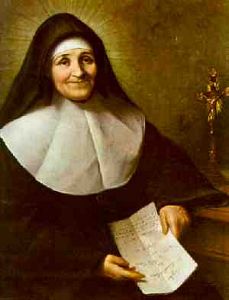 Born: July 12, 1751, France.
Born: July 12, 1751, France.Died: April 8, 1816 while in prayer in Namur, Belgium. Sixth of seven children of peasant farmers Jean-Francois Billiart and Marie-Louise-Antoinette Debraine. She was poorly educated, but knew her catechism by heart at age 7, and used to explain it to other children. At age 14 she took a private vow of chastity, and gave her life to serving and teaching the poor. At age 22, she was sitting next to her father when some one shot at him; the shock left her partially crippled for 22 years. During the French Revolution, a group of her friends helped organize the work she'd started. Julia was miraculously healed of her paralysis on 1 June 1804, and resumed her work. Her organization became the Congregation of the Sisters of Notre Dame (Institute of Notre Dame; Sisters of Notre Dame), dedicated to the Christian education of girls, formally established in Amiens, France, the first vows being made by Saint Julia and two others on 15 October 1804. By the time of her death the Institute had 15 convents. Quote: "Let us pray more and more that the Kingdom of God may spread everywhere in the hearts of all. The harvest is great but there are no laborers. Let us work at becoming good laborers!" - St. Julie Billiart  Italian. 1844-1890
Italian. 1844-1890Beatified by Pope John XXIII on Nov. 12, 1961. Capuchin priest. Having a special gift working with those seeking the Franciscan life, he was made assistant novice master, then director of candidates for the order. Died on a preaching tour. Both miracles for his beatification. "Let everyone pay attention to his own nature. For, while one person can get along with less indulgence, I would not have another, who requires more, try to imitate him; but rather let him take his own nature into account and grant it what it truly needs. Just as we must guard against superfluity of food, so must we beware of too great abstinence. God wants mercy, not sacrifice." - Bl. Innocent of Berzo  Beheaded in the year 250 in Carthage.
Beheaded in the year 250 in Carthage.Three of a group of 50 Christians who were imprisoned in a pen of snakes, scorpions, and then martyred, all during the persecutions of Decius. Prayer: God of all creation, you gave your martyrs the privilege of being counted among the saints who gave their lives in faithful witness to the gospel. May their prayers give us the courage to share with them the cup of suffering and to rise to eternal glory. We ask this through our Lord Jesus Christ, your Son, who lives and reigns with you and the Holy Spirit, one God, for ever and ever. Amen. 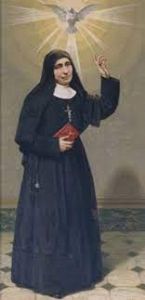 1835-1914, Lucca, Italy
1835-1914, Lucca, ItalyFrom an early age Elena was devoted to the Holy Spirit. She worked with the Vincentians, caring for the poor and the sick, studying Latin and the writings of the Church Fathers. At age 22 she fell victim to an illness that kept her bed-ridden for eight years, during which time she continued her studies. Sister (now Blessed) Elena Guerra, is foundress of the Oblate Sisters of The Holy Spirit in Italy (Sisters of St. Zita). The Oblates continue their work today with houses in Italy, Brazil, Canada, Philippines, Lebanon and Iran. St. Gemma Galgani, whose feast day is also today, was one of Sr. Elena's students. Between 1895-1903, Sr. Elena wrote 12 confidential letters to Pope Leo XIII, asking him to encourage greater devotion to the Holy Spirit among Catholics. As a result, the Pope published his encyclical on the Holy Spirit, Divinum Illud Munus, in 1897. He also sent a private letter to all bishops, prescribing that the Novena for Pentecost be prayed at the dawn of the new 20th century. "Pentecost is not over. In fact it is continually going on in every time and in every place, because the Holy Spirit desired to give himself to all men and all who want him can always receive him, so we do not have to envy the apostles and the first believers; we only have to dispose ourselves like them to receive him well, and He will come to us as he did to them." - St. Elena Guerra St. Elena Guerra, pray for us! 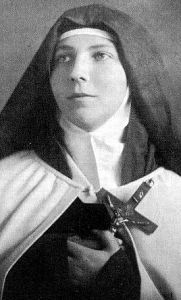 (also known as Juanita Fernandez Solar)
(also known as Juanita Fernandez Solar)Chilean, 1900-1920 Canonized on March 21, 1993 by Pope John Paul II Born to an upper class family. From her adolescence Teresa was devoted to Christ. Greatly influenced by the autobiography of St. Therese of Lisieux. She entered the monastery of the Discalced Carmelite nuns Los Andes on May 7, 1919, and was given the name Teresa of Jesus. A model for young people. The first Chilean and the first member of the Teresian Carmel in Latin America to be beatified. Her brother Luis attended her beatification in 1986. In February of 1917 Juanita went with her mother in pilgrimage to the shrine of the Lourdes Grotto in Santiago. She wrote in her Diary the following meditation as a prayer to Mary.... "Yes, Mother, you are the celestial Madonna who guides us. You allow heavenly rays to fall from your maternal hands. I didn't believe such happiness could exist on earth; yesterday my heart, while thirsting for it, found it. My soul was ecstatic at your virginal feet, listening to you. You were speaking and your maternal language was so tender. It was from heaven, almost divine." St. Teresa of the Andes, pray for us!  Hosanna to you, Son of David, King of the ages,
Hosanna to you, Son of David, King of the ages,-hosanna to you, victor over death and the powers of darkness. You went up to Jerusalem to suffer and so enter into your glory, -lead your Church into the paschal feast of heaven. You made your cross the tree of life, - give its fruit to those reborn in baptism. Savior of mankind, you came to save sinners, - bring into your kingdom all who have faith, hope, and love. Prayer for Passion Sunday.... Loving God, I am just beginning to realize how much you love me. Your son, Jesus was humble and obedient. He fulfilled your will for him by becoming human and suffering with us. I ask you for the desire to become more humble so that my own life might also bear witness to you. I want to use the small sufferings I have in this world to give you glory. Please, Lord, guide my mind with your truth. Strengthen my life by the example of Jesus. Help me to be with Jesus in this week as he demonstrates again his total love for me. He died so that I would no longer be separated from you. Help me to feel how close you are and to live in union with you. Amen. 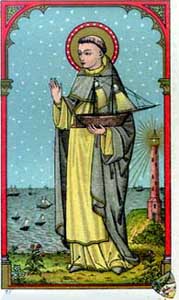 Spanish, 1190-1246
Spanish, 1190-1246Castilian nobility who mis-spent a worldly youth. Educated by his uncle, the bishop of Astorga, Spain. Priest, primarily as a step to high office. Obtained special papal dispensation to become Canon of Palencia when he was officially still too young. During a grand Christmas Day entrance into the city, his horse was spooked by the noise of the crowds. It threw him in all his finery onto a dung-heap, much to the delight of the citizens who knew his was a political, not a spiritual appointment. Dazed, filthy, humiliated, and with the undeniable understanding that his parishioners thought he was a hack, he withdrew from the world for a period of prayer and meditation. It worked. He had a true conversion experience and spent the rest of his life making up for his lost youth and the mockery he made of his position. Joined the Dominicans. Family and friends tried to draw him back to his old life and their planned pursuit of position, but he responded, "If you love me, follow me! If you cannot follow me, forget me!" Confessor and court chaplain to King St. Ferdinand III of Castile. Against the opposition of more worldly courtiers, he reformed court life around the king. Worked for the Crusade against the Moors, accompanied Ferdinand into the battlefields, and then worked for humane treatment of Moorish prisoners. A favorite of the king, Peter feared the honors and easy life would lead him to a return to his previous ways, so he left the court and evangelized to shepherds in the hills, along the waterfronts, and among Spanish and Portuguese sailors who still venerate him and consider him their special patron, blending his story with that of Saint Elmo, and calling upon him for protection in the face of bad weather. Almighty God, you bestowed the singular help of Saint Peter Gonzales on those in peril from the sea. By the help of his prayers may the light of your grace shine forth in all the storms of this life and enable us to find the harbor of everlasting salvation. We ask this through our Lord Jesus Christ, your Son, who lives and reigns with you and the Holy Spirit, one God, for ever and ever. Amen. St. Pedro Gonzales, pray for us! 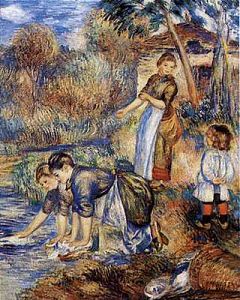 "The Holy Washerwoman"
"The Holy Washerwoman"Died: 679 in Hunawir, Alsace (in modern France) Daughter of the duke of Alsace. Wife of an Alsatian nobleman named Huno of Hunnaweyer, she lived in the diocese of Strasbourg. Mother of one; her son, Deodatus, was baptized by Saint Deodatus of Nevers, and eventually became a monk. Donated property to monasteries, and financed the construction of churches. Devoted to the poor, Hunna would help the less advantaged with any task, and was given to helping all her neighbors, regardless of class or station, with their laundry. 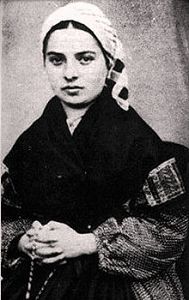 French, 1844-1879
French, 1844-1879Visionary and messenger of the Immaculate Conception at Lourdes Prayer by St. Bernadette in Times of Affliction.... O my God, I beg You, by Your loneliness, not that You may spare me affliction, but that You may not abandon me in it. When I encounter affliction, teach me to see You in it as my sole Comforter. Let affliction strengthen my faith, fortify my hope, and purify my love. Grant me the grace to see Your Hand in my affliction, and to desire no other comforter but You. Amen. St. Bernadette, pray for us! Our Lady of Lourdes, pray for us! 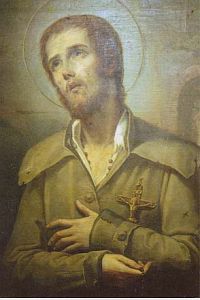 French, 1748-1783
French, 1748-1783Patron Saint of the homeless and those suffering from mental illness. Benedict Joseph was born to a middle class family in France, the eldest of 15 children. His parents ensured that he was provided with the finest educational opportunities as he matured, but Benedict Joseph only appeared interested in those that would bring him closer to the Lord. Benedict Joseph was single-minded in his pursuit of holiness. He was determined to enter a religious order, specifically the Trappists. For many years he traveled to different orders, seeking admission, but was always turned away at the onset due to his age, or following admission, due to his health. It is likely, although unknown, that Benedict Joseph suffered from a serious mental illness, yet throughout his suffering, remained true to the Lord, constantly seeking a deeper union with Him. Saint Benedict Joseph Labre died of malnutrition in 1783. Due to his popularity, his body was laid in state for nearly a week, and visited by thousands during that time. 136 separate miraculous cures were attributed to him in the first 3 months following his death. His body was laid in a tomb, at an altar in a chapel of Santa Maria dei Monti in Rome, where it remains today. Prayer to St. Benedict Joseph Labre: Saint Benedict Joseph Labre, you gave up honor, money and home for love of Jesus. Help us to set our hearts on Jesus and not on the things of this world. You lived in obscurity among the poor in the streets. Enable us to see Jesus in our poor brothers and sisters and not judge by appearances. Make us realize that in helping them we are helping Jesus. Show us how to befriend them and not pass them by. Amen. St. Benedict Joseph Labre, pray for us! 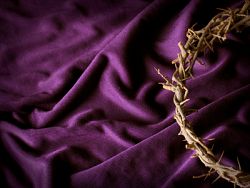 Prayer for Good Friday....
Prayer for Good Friday....My Lord, your son has suffered so much, shed so much blood. I was born with so many faults and my nature is so full of weakness, and yet your son Jesus has died on the cross. For me. I know your grace has the power to cleanse me of my many sins and to make me more like your Son. Thank you for your goodness and love for me. I ask you, Father, to watch over me - always. Amen. 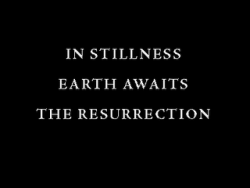 Reflection:
Reflection:As we behold the body of Jesus in the tomb today, and as we contemplate the mystery of our death, we prepare our hearts to receive the Good News of life. We know that tomb will be empty and remain empty forever as a sign that our lives will not really end, but only be transformed. One day, we will all rest in the embrace of Jesus, who knows our death, and who prepares a place for us in everlasting life. Our reflection on this holy Saturday, and our anticipation of celebrating the gift of life tonight and tomorrow, can bring immense peace and joy, powerful freedom and vitality to our lives. For if we truly believe that death holds no true power over us, we can walk each day in the grace being offered us - to give our lives away in love. O God, Creator of heaven and earth: Grant that, as the crucified body of your dear Son was laid in the tomb and rested on this holy Sabbath, so we may await with him the coming of the third day, and rise with him to newness of life; who now lives and reigns with you and the Holy Spirit, one God, for ever and ever. Amen. 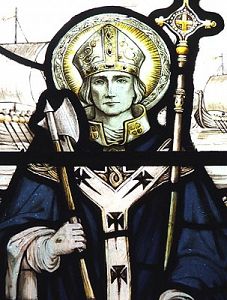 English, 954-1012, Martyr
English, 954-1012, MartyrBorn to the nobility but gave it up to become a young monk at Deerhurst Abbey in Gloucestershire, England. Monk, anchorite and then abbot at Bath Abbey; known for his personal piety and austerity. Bishop of Winchester, England in 984. Built several churches, installed a cathedral organ so large that it could be heard a mile away, and his charity was so great that there were reported to be no beggars in his diocese. May have helped negotiate a peace treaty in 994 which ended some Viking raids. Archbishop of Canterbury, England in 1006. Encouraged devotion to St. Dunstan of Canterbury. Translated the relics of St. Swithun to Canterbury. In 1011 Danes began raiding again, laid siege to Canterbury, sacked the town, and captured Alphege along with several other Church officials, all of whom were held for ransom. Reported to have healed many of sick Danes by praying over them and feeding them blessed bread. Alphege refused to approve the payment of ransom for himself, and after several months was murdered by angry drunken Vikings, the first archbishop of Canterbury to die violently. St. Thomas Becket was praying for St. Alphege's intercession just before he was murdered. Prayer..... O loving God, whose martyr bishop Alphege of Canterbury suffered violent death when he refused to permit a ransom to be extorted from his people: Grant that all pastors of your flock may pattern themselves on the Good Shepherd, who laid down his life for the sheep; and who with you and the Holy Spirit lives and reigns, one God, for ever and ever. Amen. St. Alphege of Canterbury, pray for us! 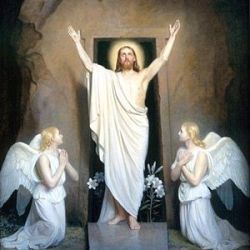 Alleluia! Jesus is Risen!
Alleluia! Jesus is Risen!Easter Prayer of St. Hippolytus of Rome (AD 190-236) Christ is Risen: The world below lies desolate Christ is Risen: The spirits of evil are fallen Christ is Risen: The angels of God are rejoicing Christ is Risen: The tombs of the dead are empty Christ is Risen indeed from the dead, the first of the sleepers, Glory and power are his forever and ever. Prayer for Easter Sunday.... Raise me up! Renew my life! Father of life, I see the light again! I was in darkness and had lost hope but Jesus Christ, your son, has won out over death - for me. I celebrate today, your love, the life you give me. I feel your presence as you breathe on my mind and open my heart. So many times in my life my eyes are closed but today I see the risen Lord in the breaking of the bread. Thank you for this morning of hope, thank you for such incredible love. Amen. 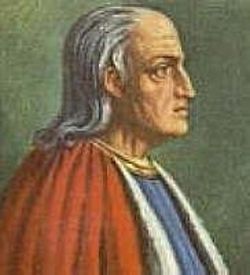 Monk, Archbishop, Theologian
Monk, Archbishop, TheologianBorn 1033 - Piedmont, Italy Died 1109 - Canterbury, England Anselm was one of the most important Christian thinkers of the eleventh century. Anselm is the most important Christian theologian in the West between Augustine and Thomas Aquinas. He is most famous in philosophy for having discovered and articulated the so-called "ontological argument" and in theology for his doctrine of the atonement. However, his work extends to many other important philosophical and theological matters, among which are: understanding the aspects and the unity of the divine nature; the extent of our possible knowledge and understanding of the divine nature; the complex nature of the will and its involvement in free choice; the innerworkings of human willing and action and divine grace; the natures of truth and justice; the natures and origins of virtues and vices; the nature of evil as negation or privation; and the condition and implications of original sin. Prayer..... O Lord, we bring before you the distress and dangers of peoples and nations, the pleas of the imprisoned and the captive, the sorrows of the grief-stricken, the needs of the refugee, the impotence of the weak, the weariness of the despondent, and the diminishments of the aging. O Lord, stay close to all of them. Amen. - prayer for all classes of people by St. Anselm St. Anselm of Canterbury, pray for us! 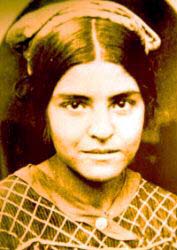 Born, 1914 in Sardinia, Italy.
Born, 1914 in Sardinia, Italy.Died, 1939 during Vespers of tuberculosis Beatified January 25, 1983 by Pope John Paul II Born to a family of shepherds. As a child she was described as obstinate, critical, protesting, and rebellious - but loyal, and obedient; she would say no to a request - but act on it at once. At 18 she became gentler, her temper abated, she became involved in prayer and charity, and joined "Azione Cattolic," a Catholic youth movement. At 21 she entered the Trappestine monastery of Grottaferrata. When she was accepted, her attitude finally became "Now do what You will." When the community's leader explained a request for prayer and offering for the great cause of Christian Unity, Maria Gabriella felt compelled to offer her young life to the cause. Though she'd never been sick before, she suddenly developed tuberculosis. In a mere 15 months spent in prayer for Unity, it took her to her death. "In simplicity of heart I gladly offer everything, O Lord. The Lord put me on this path, he will remember to sustain me in battle. To His mercy I entrust my frailty. I saw in front of me a big cross..., I thought that my sacrifice was nothing in comparison to His. I offered myself entirely and I do not withdraw the given word. God's will whatever it may be, this is my joy, my happiness, my peace. I will never be able to thank enough. I cannot say but these words:'My God, your Glory'" - Blessed Maria Gabriella Blessed Maria Gabriella Sagheddu, pray for us! 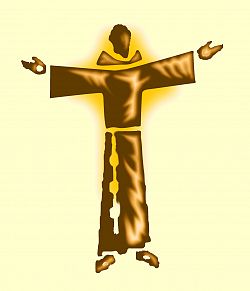 Died 1262 at Perugia, Italy.
Died 1262 at Perugia, Italy.Friend and third follower of St. Francis of Assisi. Sent as a missionary to Muslims in Tunis, but had no success. Upon his return, he lived at various places in Italy where for the rest of his days he was in demand as a spiritual advisor; his "Sayings" have been printed in many editions. Assigned later to the hermitage of Fabriano where he led a life of quiet contemplation. "To me it seems that contemplation is a divine fire, a sweet devotion infused by the Holy Ghost, a rapture and suspension of the mind inebriated by the unspeakable savor of divine sweetness, and a sweet and tranquil enjoyment of the soul which is rapt and suspended in loving admiration of the glories of heaven, and an inward burning consciousness of that celestial and unspeakable glory." - Brother Giles of Assisi Brother Giles of Assisi, pray for us! 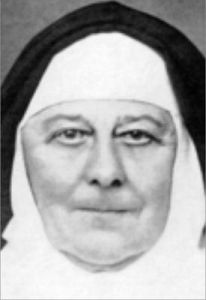 French. Born during the French Revolution in 1796- Died, 1868.
French. Born during the French Revolution in 1796- Died, 1868.Founder of The Congregation of Our Lady of Charity of the Good Shepherd (Good Shepherd Sisters) at Tours, France and established their monastery at Angers, France in 1829; a contemplative order. She was recognized as Superior-General of the Congregation in 1831, and received approval from Pope Gregory XVI in 1835. The Congregation has sisters working in Italy, Germany, Belgium, England, Algeria, the U.S., Canada, Egypt, Ireland, Australia, India, Chile, Malta, the Netherlands, Australia, and Myanmar. By the end of her life, there were over 2,000 sisters established in 100+ houses on five continents; this rapid expansion led to her being known as a patron of travelers. "Draw near to our Lord, thoroughly aware of your own nothingness, and you may hope all things from His Goodness and Mercy. Never forget that Jesus Christ is no less generous in the Blessed Sacrament than He was during His mortal life on earth." - St. Mary Euphrasia Pelletier St. Mary Euphrasia Pelletier, pray for us! 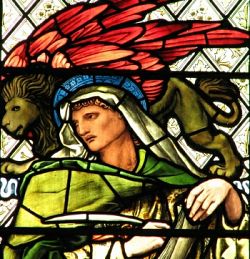 Martyred in the year 68 at Alexandria, Egypt.
Martyred in the year 68 at Alexandria, Egypt.The second Gospel was written by St. Mark, who, in the New Testament, is sometimes called John Mark. Both he and his mother, Mary, were highly esteemed in the early Church, and his mother's house in Jerusalem served as a meeting place for Christians there. St. Mark was associated with St. Paul and St. Barnabas (who was Mark's cousin) on their missionary journey through the island of Cyprus. Later he accompanied St. Barnabas alone. We know also that he was in Rome with St. Peter and St. Paul. Tradition ascribes to him the founding of the Church in Alexandria. St. Mark wrote the second Gospel, probably in Rome sometime before the year 60 A.D.; he wrote it in Greek for the Gentile converts to Christianity. Prayer: Almighty God, who by the hand of Mark the evangelist have given to your Church the Gospel of Jesus Christ the Son of God: We thank you for this witness, and pray that we may be firmly grounded in its truth; through Jesus Christ our Lord, who lives and reigns with you and the Holy Spirit, one God, for ever and ever. Amen. St. Mark the Evangelist, pray for us! 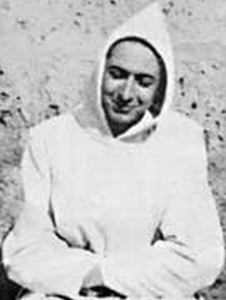 Born: April 9, 1911, Burgos, Spain
Born: April 9, 1911, Burgos, SpainDied: April 26, 1938, Duenas, Palencia, Spain Canonized, October 11, 2009 by Pope Benedict XVI An artistic young man, he studied architecture in Madrid, Spain. However, he felt a call to the religious life, and on 15 April 1934 Rafael became an oblate friar of the Order of Cistercians of the Strict Observance (Trappist). Suffered from acute diabetes, a condition that forced him to leave the monastery three times, but each time, as soon as he was sufficiently healed, he returned to the monastic life. Prayer: Omnipotent Lord who glorifies the humble and strikes down the arrogant, we implore you for the glory of your Holy Name that you uplift the memory of Saint Rafael. Granting to us the grace that we ask of you by his intercession, who lived and died to glorify You, Lord; who with the Son and the Holy Spirit lives and reigns forever. Amen. St. Rafael Arnaiz Baron, pray for us! 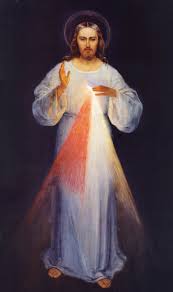 (The First Sunday after Easter)
(The First Sunday after Easter)"The Feast of Mercy emerged from my very depths of tenderness. It is my desire that it solemnly be celebrated on the first Sunday after Easter. Mankind will not have peace until it turns to the fount of My Mercy." "Jesus, I Trust In You" 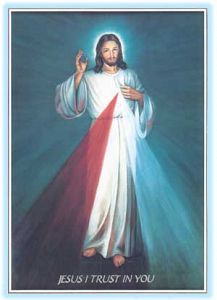 (The First Sunday after Easter)
(The First Sunday after Easter)"The Feast of Mercy emerged from my very depths of tenderness. It is my desire that it solemnly be celebrated on the first Sunday after Easter. Mankind will not have peace until it turns to the fount of My Mercy." "Jesus, I Trust In You" 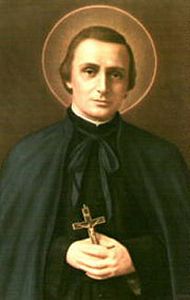 French. Martyr. 1803-1841
French. Martyr. 1803-1841Born to a peasant family, he was a shepherd as a boy. An excellent student. Ordained in 1827 at age 24. He was assigned to Crozet, a parish in decline; he turned it around, in part because of his ministry to the sick, and brought a spiritual revival. Joined the Society of Mary (Marist Fathers) in 1831. Taught at the Belley seminary for five years. Led a band of missionaries to the New Hebrides in 1836, an area where cannibalism had only recently been outlawed. He converted many, often as a result of his work with the sick. He learned the local language, and taught in the local school. Killed by order of Niuliki, a native king who was jealous of Peter's influence. Peter was beaten to death with a club. First martyr in Oceania. Prayer... St. Peter Chanel, you left your homeland to proclaim Jesus, Savior of the world, to the peoples of Oceania. Guided by the spirit of God, who is the strength of the gentle, you bore witness to love, even laying down your life. Grant that like you we may live our daily life in peace, joy, and in love. May your prayers and example call forth from our midst many workers for the Gospel so that God's kingdom may reach to the ends of the earth. Amen. St. Peter Chanel, pray for us! 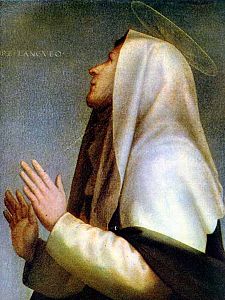 Italian. 1347-1380
Italian. 1347-1380Youngest child in a large family. At the age of six she had a vision in which Jesus appeared and blessed her. Her parents wanted her to marry, but she became a Dominican tertiary. Mystic. Stigmatist. Received a vision in which she was in a mystical marriage with Christ, and the Infant Christ presented her with a wedding ring. Counselor to Pope Gregory XI and Pope Urban VI. Proclaimed Doctor of the Church on October 4, 1970. "Charity is the sweet and holy bond which links the soul with its Creator: it binds God with man and man with God." - St. Catherine of Siena Prayer...... God of Wisdom you made our sister Catherine burn with divine love in contemplating the Lord's passion and in serving your Church. With the help of her prayers may your people, united in the mystery of Christ, rejoice forever in the revelation of his glory, who lives and reigns with you and the Holy Spirit, God, for ever and ever. Amen. St. Catherine of Siena, pray for us! 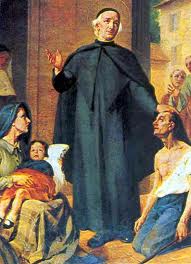 Italian. 1786-1842
Italian. 1786-1842Born to a middle class family. Studied at the seminary in Turin. Ordained in 1811. Parish priest in Bra and Corneliano. Doctor of Divinity. Joined the Order of the Corpus Christi in Turin. Canon of the Church of the Trinity in Turin. For several years, Joseph treated his priesthood more as a career than a vocation. Then one night he was called to the bed of a poor, sick, woman in labor. The woman badly needed medical help, but had been turned away everywhere for lack of money. Joseph stayed with her throughout the travail, and was there to hear her confession, give her absolution, Communion, and last rites. He baptized her newborn daughter, and then watched as both of them died in bed. The trauma of the evening changed his mind about his vocation. In 1827, he opened a small shelter for the area sick and homeless, renting a room, filling it with beds, and seeking male and female volunteers. The place expanded, and he received help from the Brothers of Saint Vincent and the Vincentian Sisters. During a cholera outbreak in 1831, the local police closed the hospice, fearing it was a source of the illness. In 1832 he transferred the operation to Valdocco, and called the shelter the Little House of Divine Providence (Piccola Casa). The Casa began receiving support, and grew, adding asylums, orphanages, hospitals, schools, workshops, chapels, alms-house, and programs to help the poor, sick, and needy of all types. This small village of the poor depended almost entirely on alms, Joseph kept no records, and turned down offers of state assistance; never once did they do without. Joseph directed the operation until a few days before his death, and the Casa continues to today, serving 8,000 or more each day. He founded fourteen communities to serve the residents, including the Daughters of Compassion, Daughters of the Good Shepherd, Hermits of the Holy Rosary, and Priests of the Holy Trinity. "When I am in Heaven, where everything is possible, I will cling to the mantle of the Mother of God and I will not turn my eyes from you. But do not forget what this poor old man has said to you. " - Saint Joseph from his deathbed St. Joseph Benedict Cottolengo, pray for us! |




